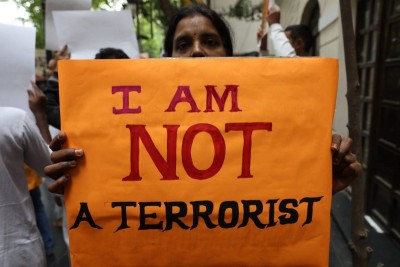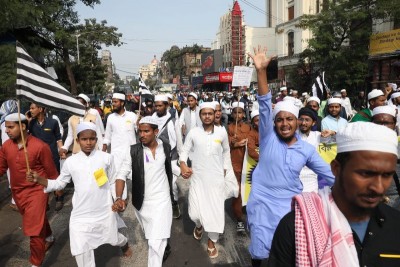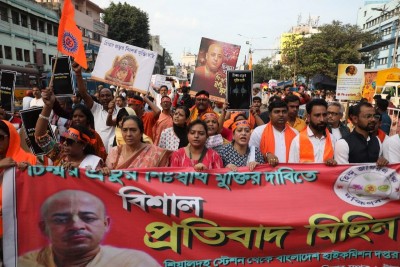
Parliament should not become a platform for scoring political brownie points: Vice President Naidu
New Delhi, Dec 30 (IBNS): Vice President of India M. Venkaiah Naidu has said that the Parliament should not become a platform for scoring political brownie points.
He was addressing a seminar on “Revitalizing Parliamentary Democracy in India” on the occasion of the 187th anniversary celebrations of Kolkata Chamber of Commerce, in Kolkata today.
The Vice President called for serious introspection on the part of political parties to see that Parliament does not become a platform for scoring political brownie points. There is no other alternative but to ensure that Parliament functions in an effective and responsive manner to further peace, progress and prosperity in the country, he added.
The Vice President expressed concern over the functioning of Parliament in the backdrop of the severe criticism from various quarters, including the parliamentary fraternity itself. This criticism may be due to a decline, in recent years, in both the quantity and quality of parliamentary work, he added.
The Vice President said that over the years, Parliament’s legislative business and the number of hours it devotes to debate crucial issues of national importance have come down. Even, the relatively fewer days when the Parliament meets are often marked by pandemonium, resulting in frequent adjournments on trivial topics, he added.
The Vice President said that disruptions during parliament session are a matter of great concern as they have become the order of the day with the political parties failing to rein in their members. He further said that at present ‘healthy debate and discussions, the hallmark of Parliamentary democracy’ are overshadowed by disruption, confrontation, and forced adjournments of the house. There is a need for political parties to arrive at a consensus on this important issue so that the precious time of the Parliament and legislatures is not wasted on issues which can be best resolved through debates and dialogues, he added.
Following is the text of Vice President's address:
I am immensely pleased to participate in the 187th anniversary celebrations of Kolkata Chamber of Commerce, which I am told is the oldest Commerce and Industry Association not only in India but in entire Asia.
I am told that as per records of the Association, the idea of business assembly was first mooted at a meeting held on 5th July, 1830 attended by about 200 businessmen of the Kolkata and the Kolkata Trades Association was born under the aegis of Mr. Samuel Smith who assumed the post of the President.
The foundation of the first ever business organization was thus laid in Kolkata the then Capital of India, to encourage trade and commerce and accelerate business and industrial growth.
In 1977, the Kolkata Trades Association assumed the name “Kolkata Chamber of Commerce". I am glad that for more than 180 years, this august body has been contributing towards the development of Calcutta and the country.
I am happy to note that the Kolakata Chamber of Commerce Foundation grants scholarships, stipends and prizes and other types of assistance to the needy and brilliant students, scholars and entrepreneurs for studies, research and other activities relating to socio-economic, scientific and technological advancement. The Foundation, I am told, has granted assistance to the victims of Kargil and Tsunami and earthquakes, among others.
I also compliment the Foundation for recognizing outstanding sportspersons and women who achieved fame through “Prabha Khaitan Puraskar”.
I compliment the Kolkata Chambers for the immense contribution it has made for the economic growth of this region in particular and the country in general.
Friends, as you all know, India is again set to become the fastest growing economy in the world with the GDP expected to grow at 7.2 per cent in 2018 and 7.4 per cent in 2019. According to some projections, India will become the fifth largest economy in 2018 itself and the third largest economy in the next 10-15 years.
As the country progresses on the basis of strong macro-economic fundamentals, the fruits of development must reach every section and the growth we are scripting has to be inclusive. There will not be any meaning to development, if some sections remain untouched by the prosperity. We all must strive to fulfil the dreams of Mahatma Gandhi, Dr. B. R. Ambedkar and Pandit Deendayal Upadhyay and ensure that the fruits of development reach the last poor man in the line.
With the initiation of various reforms, India has become one of the most attractive destinations for foreign investments. The highest ever inflow of equity in the form of foreign direct investments (FDI) worth US$ 43.4 billion was received in 2016-17.
With the outlook appearing bright for Indian economy, I would like Commerce bodies like yours to play an active role in skilling the youth so that India could take maximum advantage of its demographic potential. Opportunities are plenty and the energies of the youth of the country need to be properly harnessed through initiatives like ‘Skill India’, Digital India, Stand-up India and Start-up India.
Since all of you are from industry background, you know better than anybody else on the dire need to improve the skills of youth so that they not only become employable, but also become job creators rather than remain job seekers.
I would also appeal to you to expand your activities under CSR and complement the efforts of the government, particularly in taking urban amenities to rural areas. India lives in its villages as famously stated by the Father of the Nation and unless the rural areas are transformed into thriving hubs of economic activity, the urban-rural divide will continue to widen and development will remain lop-sided. Similarly, take up special initiatives to impart vocational training to women, eradicate illiteracy, empower girl child, bridge the digital divide and support the ‘Clean India’ campaign.
REVITALIZING PARLIAMENTARY DEMOCRACY
The Parliament is the nerve centre of India’s democracy and the custodian of people’s interests and rights. It is the temple of democracy and a sacred public institution. India’s Parliamentary system has matured over the years and stood the test of time.
Parliament is the most pivotal institution in India’s democratic polity. Over the years, the changing needs of the people warranting legislations in newer areas have made the legislative and surveillance role of Parliament more complex and diversified. The unprecedented growth in the range and magnitude of the governmental activities has made the role of Parliament all the more significant since the executive is accountable to the Parliament.
However, to meet the ever-increasing expectations from Parliament, it needs to constantly review its structural-functional requirements as also the entire gamut of its operational procedures and strengthen the resources at its disposal.
As of today, we have almost successfully conducted 16 general elections in the largest democracy on the planet. Moreover, our Parliamentary system has ensured ‘peaceful transfer of power’ as there were no hiccups, pressures, stresses and strains at any time. We all must be legitimately proud of this remarkable achievement of India’s Parliamentary democracy.
With coalition governments, at times, becoming inevitable in India’s multi-party system and the threat of instability undermining the faith of well-meaning critics in Parliamentary democracy, we can still be proud of the fact that we have till date experienced a good deal of political stability.
Of late, the functioning of Parliament in the country has come under severe criticism from various quarters, including the parliamentary fraternity itself. This criticism is due to the way the Parliament and the State legislatures are functioning. It may be due to a decline, in recent years, in both the quantity and quality of parliamentary work.
Over the years, the number of days for which Parliament normally meets to transact legislative and other businesses and the number of hours it devotes to debate national issues has come down significantly. Even, the relatively fewer days when the Parliament meets are often marked by pandemonium, resulting in frequent adjournments on trivial topics.
It is a matter of concern that disruptions have become the order of the day with the political parties failing to rein in their members. There is a need for political parties to arrive at a consensus on this important issue so that the precious time of the Parliament and legislatures is not wasted on issues which can be best resolved through debates and dialogues.
But unfortunately, at present ‘healthy debate and discussions, the hallmark of Parliamentary democracy’ are overshadowed by disruption, confrontation, and forced adjournments of the house. On many occasions, Parliament gets stalled resulting in wastage of public money and loss of working hours. As a result, Parliament finds itself disabled to discuss and deliberate on important socio-economic issues which affect the people and the country.
The time has come for serious introspection on the part of political parties to see that Parliament does not become a platform for scoring political brownie points. There is no other alternative but to ensure that Parliament functions in an effective and responsive manner to further peace, progress and prosperity in the country.
Friends, I feel corrective steps are urgently needed to strengthen Parliament's role as the country's highest democratic institution, representing the sovereign will of the people. Also, it is of the utmost importance for survival of democracy that Parliament continues to occupy an esteemed position in the minds and hearts of the people."
Support Our Journalism
We cannot do without you.. your contribution supports unbiased journalism
IBNS is not driven by any ism- not wokeism, not racism, not skewed secularism, not hyper right-wing or left liberal ideals, nor by any hardline religious beliefs or hyper nationalism. We want to serve you good old objective news, as they are. We do not judge or preach. We let people decide for themselves. We only try to present factual and well-sourced news.







